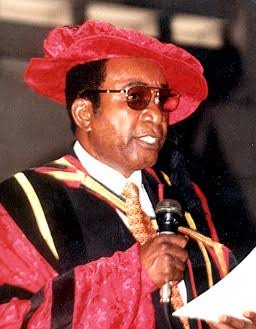By Sammie Echi Agbo
A man who does not know where rain began to beat him cannot know where he dried his body. This popular Igbo adage, which iconic Igbo novelist and essayist, Prof Chinua Achebe, always found didactic, incisive and instructive, captures the present economic quagmire ravaging Africa as a whole, although the scope of this narrative is in the old Anambra State. The three states that constituted the old Anambra State are Anambra, Ebonyi and Enugu.
All has not been rosy in terms of rekindling the industrial revolution the old Anambra State recorded during the era of Chief Jim Nwobodo as governor. However, there is light at the end of the tunnel with the innovative administration of Gov Peter Mbah of Enugu State. Exploits in Ebonyi and Anambra will be interrogated in the later publications of these series.
Between 1979 and 1983, the old Anambra State was governed by Chief Jim Ifeanyichukwu Nwobodo, a University of Ibadan-graduate of English and astute businessman. Riding on the heels of the likes of Nigeria’s first President, Dr Nnamdi Azikiwe, who is the Aristotle of the Igbo race, Nwobodo, popularly called Jim, came to government all-round prepared.
In the industrial sector, which is the focus of this piece, Jim, whom I have times without number referred to as ‘The Man Who Saw Tomorrow’, conceptualised the industrialisation of the old Anambra State in a way that if we had many ‘Jims’ in that trajectory till date, the old Anambra State and, indeed, South-East Nigeria would have been the Japan of Africa. This dream has remained a mirage and your guess is as good as mine.
Jim Nwobodo initiated the birthing of the Anambra Vegetable Oil Products (AVOP), Nachi, in Udi Local Government Area of Enugu State. AVOP is a former major Nigerian vegetable oil production company. It was built for the purpose of producing and marketing vegetable oil in the old Anambra State, and to serve the entire Nigeria and many sub-regional African countries.
It excellently played its role within a short time of its existence. It was flourishing and a household name. It later got burnt, and today is a shadow of itself. Its death was after the tenure of Nwobodo as governor in 1983.
Jim Nwobodo also established the Sunrise Flour Mills Ltd, Emene, Enugu. It was established in 1983 for the production of flour, semolina and wheat. It went moribund in 1985, no thanks to the International Monetary Fund’s Structural Adjustment Programme, SAP, which the military government of former President Ibrahim Babangida ill-keyed into. Since then, its resuscitation has always ended on the drawing board.
The herculean tasks Nigerians pass through in importing and buying building materials today would have been a story of the old testaments if the Building Materials Factory in Ezillo, Ebonyi State, remained operational in the manner Chief Jim Nwobodo planned it. The industry was established for the manufacturing of various building materials using local contents. This factory factored the fact that the old Anambra State is blessed with untapped raw materials for the sustained production of building materials overtime. It also went moribund.
Jim Nwobodo also initiated the state-owned Metallurgical Factory at Ozubulu in Anambra State. This factory was envisioned for the production of primary and secondary metals. The ‘primary’ refers to the production of metal from ore while the ‘secondary’ refers to the production of alloys from ingots and to recovery of metal from scrap and salvage. It would have been the epicentre for recycling of metals and conversation of scraps to finer products in Nigeria.
Today, Nigeria is populated by foreign agencies who evacuate our scraps as ‘iron condemn’, and export them for refining. Afterwards, they are shipped back into Nigeria as reincarnated products for marketing, giving credence to insinuations that Nigeria is a dumping ground of imported goods, the quality insignificant.
In the aftermath of the going down the drain of some of these industries, many jobs were lost; hopes were dashed, and criminal thoughts erupted, after all, an idle mind is the devil’s workshop. The failure of successive administrations, both at state and federal levels, to resuscitate and sustain these moribund industries is where the rains began to beat us. We are therefore looking towards where we dried our body.
Nigeria’s economic woes are due to lack of visionary leaders who will see tomorrow like Chief Jim Nwobodo did some forty-four years ago. It is not rocket science for our present leaders to borrow a leaf from top-notch leaders who have made their marks and replicate same for the sake of posterity. It is also worthwhile for Nigerian leaders to bear in mind that leadership is a calling, and not an all-comers’ affair which is ruining the nation’s polity in the present time.
A glaring lesson to decipher from this narrative is the equity Jim Nwobodo applied in the distribution of these industries. He considered comparative advantages of each locale. He also made sure that every part of the old Anambra State got a bite of the state commonwealth. That is leadership par excellence.
I see hope in Enugu State. Gov Peter Mbah’s commitment in revitalising moribund industries and public infrastructure, and building new innovative ones inspired this brief review of the industrial exploits of former Gov Nwobodo in the old Anambra State. Gov Mbah is bringing the abandoned Enugu International Conference Centre back to life; the same thing applies to Enugu Hotel Presidential. His administration has also signed a-N40bn deal with a private firm to revitalise the much-talked about Sunrise Flour Mills, Enugu. Mbah also signed the deal to resuscitate the forgotten Enugu United Palm Products Limited.
Mbah exemplifies a leader that came all-round prepared the same way Chief Nwobodo came shortly after the Biafran Civil War, and was able to provide succour to the impoverished Igbo war survivors both in industries, education, human capacity building and agriculture. More of such feats abound, and we hope that plans are underway to get them back on track in Enugu State.
Agbo wrote from Enugu. 08033736333



